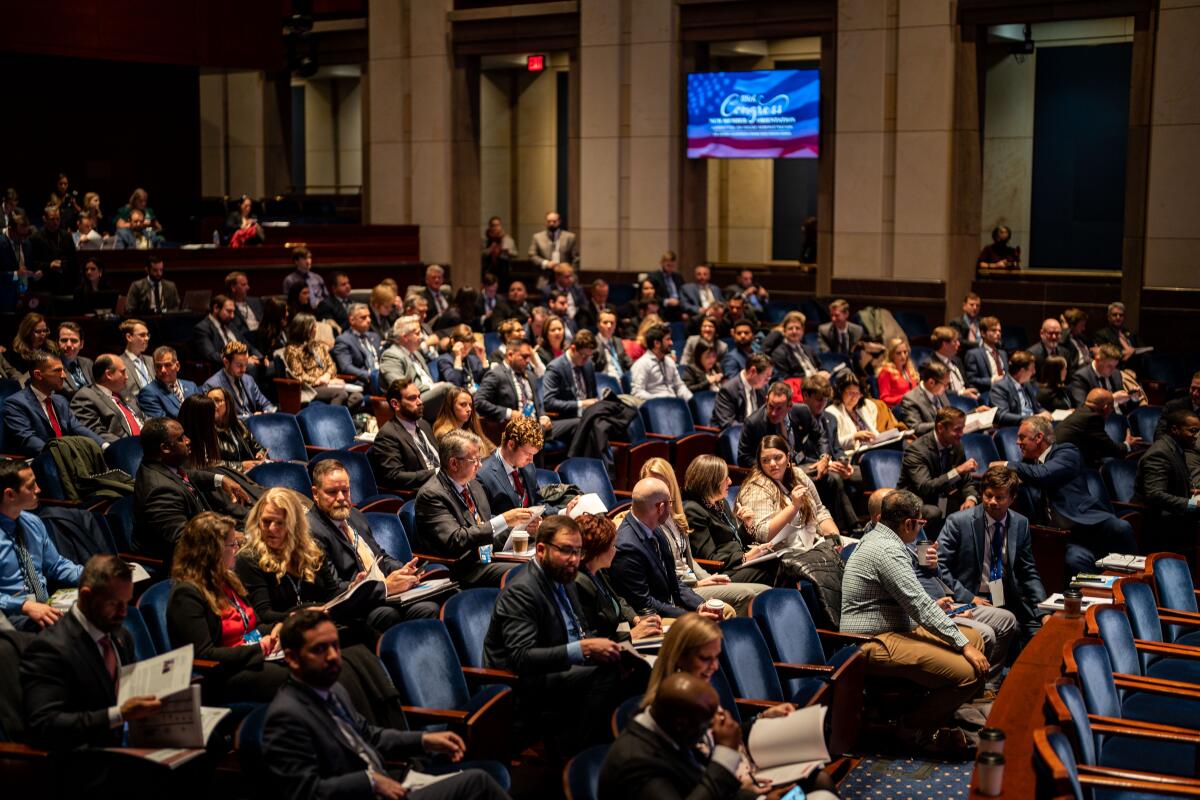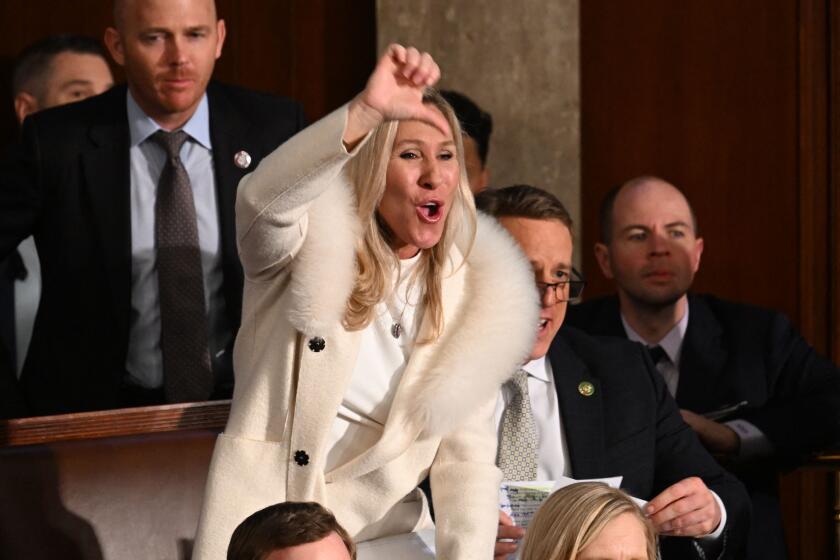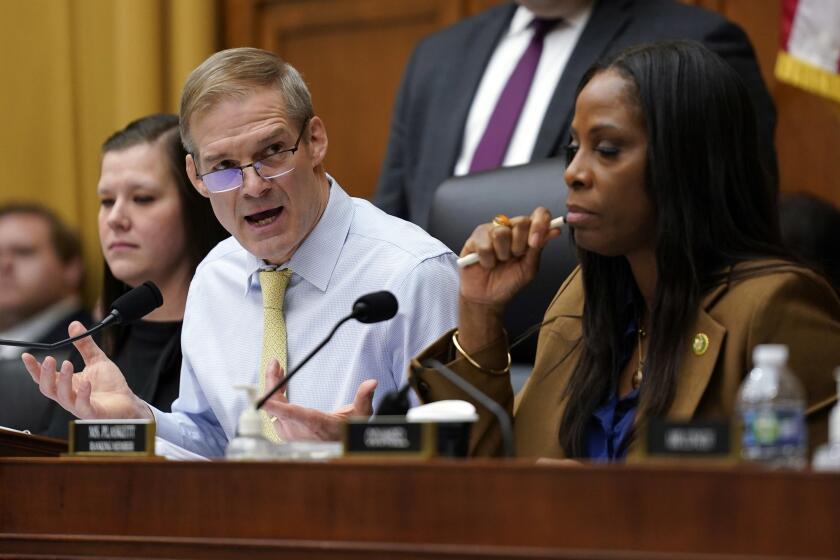Opinion: House Republicans now have a way to shut down programs they don’t like. Will they use it?

- Share via
The slim Republican majority in the House of Representatives recently voted to give itself a streamlined way to fire civil servants and shut down federal programs it doesn’t like — outside the standard process of review and debate.
This method, known as the Holman rule, has been used in the past to push extreme political agendas through the political process without due consideration for the public interest. And it’s likely to happen again.
The rule, named after a Democratic Indiana congressman who developed it in 1876, allows House members to transform the normal process of compiling appropriation bills into weapons to fire government employees and shut down programs they don’t like.
Anything is ripe for cutting with the Holman rule, including environmental protection agencies, human rights programs and programs for addressing sales of semiautomatic weapons.
Marjorie Taylor Greene leverages power with her ‘own the libs’ antics. Let’s give her what she deserves — as little attention as possible.
Rep. Kat Cammack (R-Fla.), during the House debate, attacked federal officials as “unelected bureaucrats, the true, real swamp creatures here in D.C.” She also noted, “Today marks our first move, and certainly not our last, to hold them accountable.”
Normally, cuts to staff or programs would have to go through an extensive review process, either to restructure or abolish programs.
That process includes drafting of a full-scale bill, subcommittee and full committee hearings and debates, testimony and evidence presented by the president’s administration, press coverage of these steps and adjustment of Congress members’ positions in light of that coverage.
Then, votes are held on edits to the bill, known as markups, after which there is a separate committee vote on reporting out the bill to the full House, the drafting of committee report sections by supporters and opponents — and even more after that.
But Holman sidesteps that entire process.
It allows provisions for altering or abolishing programs to be made a part of appropriation bills, as long as the provision putatively saves money. Under Holman, individual House members offer amendments during full House consideration of a bill on the floor. As long as those amendments cut spending, they are considered proper.
A new budget rule allows Congress to pass mammoth tax cuts without offsetting the revenue loss. That means the cost all gets added to the deficit and the debt.
For example, the Inflation Reduction Act of 2022 created a program to improve the technology infrastructure of the Internal Revenue Service and to hire more auditors to focus on corporations and wealthy people. Estimates are that the program will cost $80 billion over a decade. Any proposed changes to that program in legislation might well get bogged down in debate.
But under Holman, a critic of the program could just drop a change into the must-pass part of the appropriations bill that contains spending for Treasury Department operations and kill or alter the program. No one could stop that from happening unless they chose to vote against the entire appropriations bill, which funds that whole department of the government.
Similarly, the Environmental Protection Agency proposes to strengthen regulations limiting the oil and gas industry’s methane emissions, a potent greenhouse gas. A House critic of the methane-control program could just pop into the appropriations bill containing spending for the EPA a Holman provision that either cuts the salary of the program director to $1 or terminates the program altogether.
As Jacqueline Simon, public policy director of the American Federation of Government Employees, says, this reckless rule “goes around everything that protects the civil service from political corruption — not just federal employees but entire agencies. It is precisely for theater and to create chaos and disrupt the operation of federal agencies, including law enforcement agencies.”
The rule was abandoned in 1983, but the Republicans brought it back in 2017. When Democrats took over the House in 2019, they again dropped it.
In one notable case in 2017, House Republicans were angry about evaluations of proposed legislation by the staff of the nonpartisan budget analysis division of the Congressional Budget Office. So they used the Holman rule to try to abolish that division and move its employees to another part of that agency.
Jim Jordan, James Comer and others in Kevin McCarthy’s caucus in Congress waxed wacky about Hunter Biden’s laptop, FBI ‘weaponization’ and more to little avail.
The vote to eliminate the division failed, but, significantly, the use of the rule was promoted by the Freedom Caucus, the same faction of the GOP advocating for using the rule now.
There are several scenarios in the current Congress when the Holman rule could come into play — with deeply problematic results. For instance, GOP leaders may need to unify their party to pass controversial appropriation bills. Allowing members on the extreme fringe to propose Holman amendments to cut or wipe out programs may be necessary to get their votes.
Should the House pass a spending bill with a Holman provision, that bill may not necessarily be blocked by the Senate. An attempt by the Senate Democratic majority to kill a House-passed provision would need 60 votes to move ahead. That would require votes from at least nine Republican senators, which may not be possible.
An appropriations bill that contains Holman provisions would go to a conference committee, formed to reconcile differences in legislation passed by both chambers. Senate Democrats might be forced to go along with objectionable Holman provisions to get buy-in from all the House factions to pass the conference bill and avoid a government shutdown.
Which brings us full circle to where the Holman rule started — with the Southern Democrats trying to repeal Reconstruction-era laws and get those changes past President Ulysses S. Grant.
If appropriation bills loaded with awful Holman provisions reach his desk, would President Biden veto them?
Charles Tiefer is a professor of law at the University of Baltimore School of Law and was general counsel of the House of Representatives. This article was produced in partnership with the Conversation.
More to Read
A cure for the common opinion
Get thought-provoking perspectives with our weekly newsletter.
You may occasionally receive promotional content from the Los Angeles Times.













